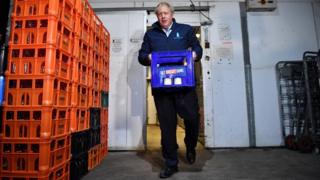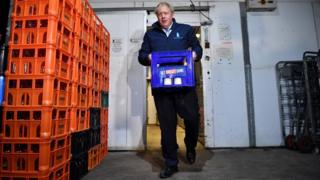Businesses urge Johnson to secure trade deals
Bosses have called on the prime minister to secure the future terms of trade with the EU. …

 Image copyright Getty Images
Image copyright Getty Images Business groups have urged Boris Johnson to begin work negotiating the terms of the UK’s future relationship with the EU after Brexit.
Following Mr Johnson’s victory in the election, which he won on a promise to “get Brexit done”, businesses have called on him to avoid no-deal.
They are concerned the UK could ditch the EU’s trade agreements with the rest of the world before writing its own.
“The real work… starts now,” said CBI director general Carolyn Fairbairn.
She told the BBC’s Today programme that businesses were seeking reassurance that they would not face another “no-deal cliff-edge” Brexit.
- Pound surges to 19-month dollar high on Johnson win
- Boris Johnson hails ‘new dawn’ after historic victory
As the outcome of the election became clear, the thoughts of business leaders would have immediately turned to Brexit, said the director general of the Institute of Directors, Jonathan Geldart.
“For directors, ‘get Brexit done’ will only have meaning once the details of our long-term future relationship with the EU are clear. They need a framework to plan for the future from,” he said.
“The prime minister must resist the urge for arbitrary negotiating deadlines and should commit to a proper adjustment period that starts when businesses know the full detail of what changes they may be facing.”
He said business bosses were more concerned about the “content and shape of any new deal” rather than simply the speed of agreeing terms.
‘Level playing field’
The president of the European Council, Charles Michel, has indicated that the EU is willing to begin negotiating with Mr Johnson.
In a tweet, congratulating the prime minister on his election win, Mr Michel said: “We will negotiate a future trade deal which ensures a true level playing field.”
And Donald Trump has said the UK would be free to strike a “massive” new trade deal with the US after Brexit.
“This deal has the potential to be far bigger and more lucrative than any deal that could be made with the EU,” the US president tweeted.
Work on hammering out details of any future deal needs to begin as soon as possible, according to Stephen Phipson, the chief executive of manufacturers’ organisation of Make UK.
“The first job is the urgent need to begin negotiations on our future trading relationship with Europe, cementing frictionless trade, access to key skills, regulatory alignment and space for business to prepare for new arrangements,” he said.
“Manufacturing exports are one of the powerhouses of our economy and we must allow them to flourish.”
‘Tale of two halves’
Dyson director and former BMW board member, Ian Robertson, has called on the government to focus its energy on trade deals with countries around the world, such as Korea and Japan, as well as with the EU.
“It’s really a tale of two halves,” he told the Today programme.
“First of all the uncertainty is now gone and I think [it’s] very good that we have a transition agreement already in place with the EU, so there is now a period of more stability looking in to 2020,” he said.
“Having said that, the focus is now on getting a trade deal by the end of next year. That will be one of the major tasks of the new government.”
Where does the UK trade?
% of total UK trade in 2018
He pointed to Mr Johnson’s promise to “get Brexit done” and said: “Now it’s get the trade deals done.”
But Legal & General boss Nigel Wilson said the the uncertainty over a future trade deal would not deter investors from putting their money into the UK.
In fact, he said there was a “wall of money” wanting to invest in the country.
“We’ve had three and a half years to prepare for Brexit,” he said, adding: “It’s a pretty poor show if we haven’t prepared.”
Analysis
Andrew Walker, World Service economics correspondent
Now it seems certain the UK will be leaving the EU at the end of January, it brings into sharper focus the matter of the future trade relationship.
The Withdrawal Agreement (WA) sets up a transition period lasting until the end of 2020. Up to that date, trade relations remain unchanged.
The government and the EU will seek to negotiate a new trade relationship in that 11-month window.
The aim, set out in the Political Declaration accompanying the WA, is an agreement that ensures no tariffs and no quotas on bilateral trade.
Such a deal would be underpinned by what are called level playing field provisions, to prevent “distortions of trade and unfair competitive advantages”.
The declaration includes these areas as important in the level playing field discussions: social and employment standards, the environment and state aids (or government financial support to business).
The more closely the UK is willing to align in these areas the more ready the EU will be to agree to tariff free trade. And the more closely aligned the UK is on wider regulation, the less exporters are likely to face checks and controls when taking goods through customs.
Those provisions are to be negotiated and it’s not hard to imagine that being a challenge. After all, for many pro-Brexit campaigners, the freedom to diverge from EU rules is one of the prizes of leaving.
That raises the question of whether the deal can be negotiated in the time available. The WA does allow the transition period to be extended by up to two years, but it also says that has to be agreed by the beginning of July 2020.
Mr Johnson will be under political pressure not to go for an extension.
Ending the transition period without a deal, or trading on what are called World Trade Organization terms with the EU, remains possible. That would mean British exporters facing the same tariffs and many other barriers that the EU imposes on other countries with which it has no trade agreement, such as China and the United States.
There are many trade partners the EU does have trade agreements with, including Japan, South Korea and Chile, who would in that situation have tariff-free access to the EU that the UK would not.



